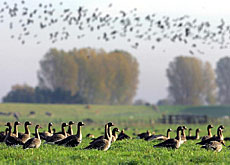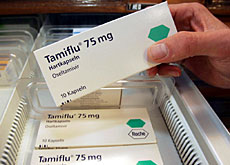Conference agrees steps to fight bird flu

Gaudenz Silberschmidt, head of international affairs at the Federal Health Office, tells swissinfo about the progress made at the bird flu conference in Geneva.
The meeting, which finished on Wednesday, was being held at the headquarters of the World Health Organization (WHO) to discuss the next steps to be taken against avian and human influenza.
Silberschmidt said that three types of flu were discussed at the meeting: seasonal winter flu, the bird flu virus caused by the strain H5N1, which has recently appeared in Romania and Turkey, and the risk of a potential human flu pandemic.
The WHO said on Wednesday that the three-day meeting had identified the key components of a global action plan against the influenza threat.
It said that delegates had also stressed the urgent need for more funding for countries already affected by bird flu and for those most at risk from the virus.
According to World Bank figures, $1 billion (SFr1.3 billion) is needed in affected countries over the next three years.
The meeting also supported an urgent request for $35 million in donations to the WHO, the United Nations Food and Agriculture Organization (FAO) and the World Organisation for Animal Health so that they can undertake urgent preparedness steps over the next six months.
swissinfo: What progress was made during the three days of the Geneva conference?
Gaudenz Silberschmidt: There was an agreement on a large set of measures and the key importance of moving towards concrete actions at global, regional and national levels.
Important steps are first and foremost to fight avian flu at its source by applying the existing and working strategies against the avian disease and in parallel advance the preparations at all levels for a potential human pandemic without getting into a panic, but by moving fast.
swissinfo: The need for more funding for the fight against bird flu seems to have been a topic at the conference. What is the Swiss view on this?
G.S.: This conference was about taking stock of the needs, it was not a pledging conference. Nevertheless the Swiss government has already decided to allocate SFr4.8 million to FAO work in Asia to fight bird flu. We managed to discuss further the modalities with the FAO during the conference.
There are smaller proposals and collaborations supported by Switzerland, but there will be a separate pledging conference which will take place in Beijing, China, on January 17-18, 2006.
swissinfo: What are the next steps after this conference?
G.S.: The financial side is one aspect, but there are also technical issues. There will be a seminar on risk communication led by the WHO because we have to get the message right.
There will be concrete fast action on fighting bird flu: countries are becoming more and more open towards the transparency which we have always called for and all countries are in the process of refining their national plans. There is also the need to work out the modalities for a potential international stockpile [of anti-viral drugs].
swissinfo: How will Switzerland be contributing to these next steps?
G.S.: Switzerland is advancing in its own preparations, it is supporting the FAO and it is fully taking its responsibility as, on the one hand, the host country of the WHO, and, on the other, of [Swiss pharmaceutical giant] Roche as the main producer of anti-viral drugs.
swissinfo-interview: Isobel Leybold-Johnson
The three-day meeting took place at the Geneva headquarters of the World Health Organization (WHO) from November 7-9.
More than 600 delegates from 100 countries took part.
The meeting was co-organised by the WHO, the UN Food and Agriculture Organization, the World Organisation for Animal Health and the World Bank.
Gaudenz Silberschmidt was head of the Swiss delegation to the conference.
Swiss pharmaceutical giant Roche said on Wednesday that it was producing enough of its antiviral drug Tamiflu to treat 55 million people this year.
Tamiflu is used in the treatment and post exposure prevention of influenza. It has been used effectively in the treatment of bird-flu victims.
The H5N1 variant of bird flu has infected at least 122 people in Asia and killed at least 62 since the virus resurfaced in late 2003.

In compliance with the JTI standards
More: SWI swissinfo.ch certified by the Journalism Trust Initiative



You can find an overview of ongoing debates with our journalists here. Please join us!
If you want to start a conversation about a topic raised in this article or want to report factual errors, email us at english@swissinfo.ch.